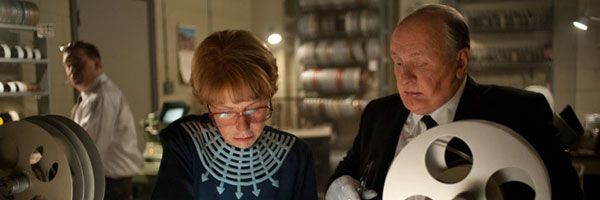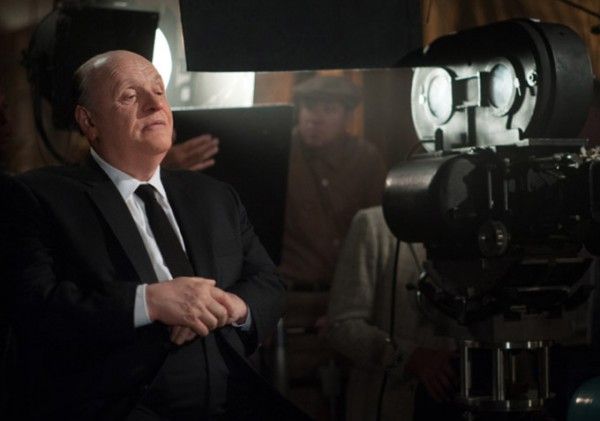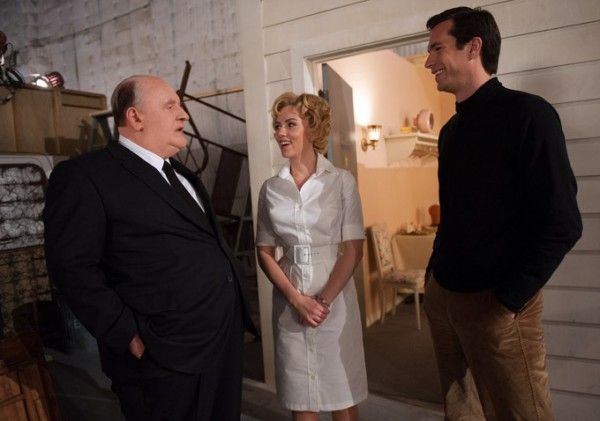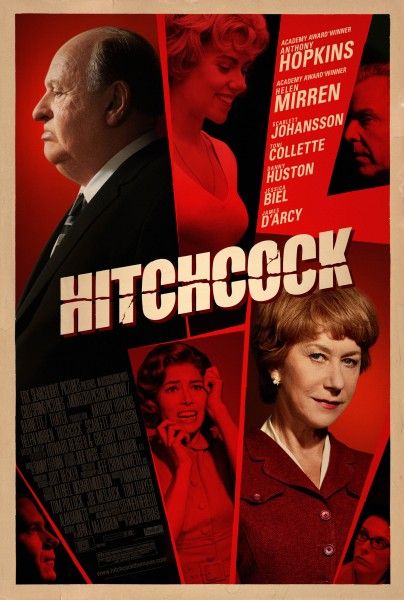When Alfred Hitchcock made Psycho, he built a foundation for the movie—woman steals money and tries to get away—before kicking the legs out from under it to leads us into an entirely new and exciting picture. Sacha Gervasi's Hitchcock sets up no such foundation as it leaps into the marital difficulties between the Master of Suspense and his wife/partner, Alma Reville. We're led into a relationship already at the brink, and in an attempt to humanize a legend like Hitchcock, he comes off as small and a bit cartoonish. We see his quirks and his insecurities, but rarely taken to a thoughtful or dangerous place. Despite the strong performances, especially from the always-reliable Helen Mirren, Hitchcock pushes us away from the eponymous filmmaker and into a sad, predictable marriage spat.
North by Northwest has just been released, and Alfred Hitchcock (Anthony Hopkins) is beginning to wonder if he has another great movie in him. He becomes fascinated by serial killer Ed Gein (Michael Wincott), and the book based on Gein's crimes, Psycho. Hitchcock plans to adapt it with the lukewarm support of Reville (Mirren), who is busy trying to take on more of a creative role by co-writing a screenplay with Whitfield Cook (Danny Huston). From the get-go, a mutual jealousy is already brewing since Hitchcock thinks Reville is sleeping with Cook, and Reville continues to notice Hitchcock's obsession with blondes, the latest being Psycho star Janet Leigh (Scarlett Johansson).
Because Hitchcock jumps right into the conflict between Hitchcock and Reville, we never get a sense of the strength of their collaboration until late in the picture. We don't feel what's been lost so all we're seeing are two people who are ticked off at each other, but are too bitter to say anything for most of the movie. Using the making of Psycho is the hook of the picture, but Gervasi and screenwriter John J. McLaughlin never find a way to cash it in, and every attempt feels forced an awkward. Seeing Hitchcock talk about his feelings with an imagined Ed Gein comes off as silly rather than darkly comic or emotionally honest.
Gervasi isn't trying to make a Hitchcock-esque picture, and nor should he have tried. Doing so would have felt truly forced because Hitchcock isn't a story of suspense. It's the story of a marriage, but one with barely on-screen chemistry between Hopkins and Mirren. It's only when the two actors are left to their own devices that we see why the characters would be attracted to each other. These are the rewarding moments of Hitchcock because Gervasi looks deeper into Hitchcock's qualities and personality to find something offbeat rather than mundane. We see how Hitchcock and Reville share a sense of voyeurism, and a scene where Hitchcock loses his stony-faced composure is a jolt of electricity to a picture that sorely needs it.
If Hitchcock does share a quality of Psycho, it's the misdirection. But in Psycho, that misdirection was unlike anything audiences had ever seen, and even today, it's a masterful piece of filmmaking. Hitchcock heads in a far more unfortunate direction. It bills itself as the making of Psycho and hints at showing the stress it took on the cast and crew, but it's truly a story about a faltering marriage. Without any buildup, it would be like seeing Norman Bates as a killer from the start. It would be factually true, but unrewarding. Gervasi shouldn't have made a thriller with Hitchcock, but an element of suspense wouldn't have gone amiss.
Rating: C-




